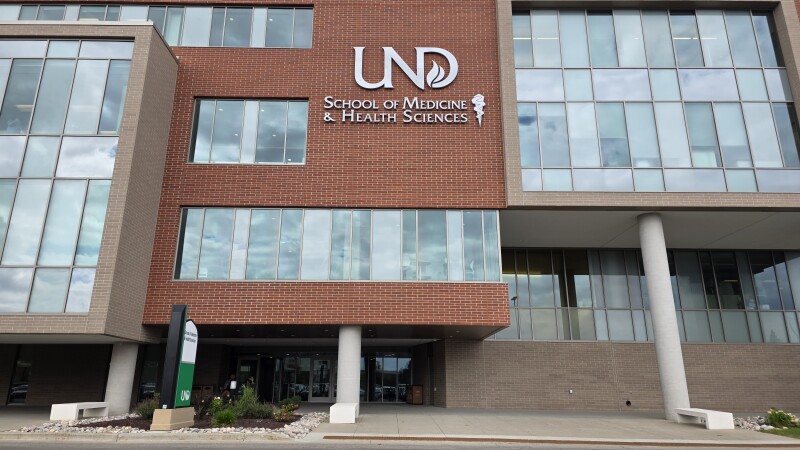World
UND’s Physical Therapy Faculty Residency Program Earns Accreditation

The University of North Dakota’s (UND) Department of Physical Therapy has achieved accreditation for its Faculty Residency Program, marking it as the fifth such program in the United States and the first in the Midwest. This accreditation comes at a critical time as the healthcare sector faces a nationwide shortage of qualified educators in physical therapy.
Gary Schindler, a professor at the UND School of Medicine and Health Sciences, stated, “Our goal is to prepare the resident to be the best faculty member they can be for a physical therapy department anywhere. This isn’t just good for UND. It’s good for the profession.” Each year, the department will welcome one licensed physical therapist resident who will serve as a short-term faculty member while completing a two-year residency.
During this residency, participants will gain valuable experience in teaching, curriculum design, and scholarly projects. They will also engage in graduate-level coursework offered through the College of Education and Human Development. Upon completion, residents will receive a College Teaching Certificate and may pursue either the Ed.D. (Doctor of Education) or Ph.D. (Doctor of Philosophy) degrees. Additionally, they will engage in the Alice T. Clark mentoring program and attend a Faculty Development Workshop through the American Physical Therapy Association.
Schindler highlighted the importance of this program, noting that residents actively participate in classroom instruction. “They’re teaching their syllabus, leading a class. As time goes on, they’re also learning about governance in higher education and service,” he explained. The residency also requires residents to fulfill a scholarship component, which involves conducting research.
The physical therapy field is experiencing a significant shortage of practitioners, as noted in the press release. Cindy Flom-Meland, chair of the Department of Physical Therapy, emphasized the impact of faculty retirements on the availability of qualified instructors. “People are retiring, resulting in faculty shortages. We see the residency as a pathway to additional faculty for us, and for Doctor of Physical Therapy programs in general,” she stated.
The need for qualified educators is underscored by the requirement for health professions to have a clinical doctorate to practice. In the realm of physical therapy, this is the Doctor of Physical Therapy (DPT) degree, which UND provides. Accrediting agencies also require a certain number of research-oriented faculty with Ph.D. degrees in academic programs to ensure quality education.
Dave Relling, senior associate dean for health sciences at UND SMHS, pointed out the scarcity of Ph.D.-trained physical therapists. “Health science training programs often have to grow their own faculty in-house,” he said. He provided an example where a department might struggle to hire a full-time faculty member due to the lack of a Ph.D. or Doctor of Education degree. “This helps build the next generation of physical therapy educators at a time when they’re needed most,” Relling concluded.
The accredited PT Faculty Residency Programs are not unique to UND. Other notable institutions include Duke University in North Carolina, Nova Southeastern University in Florida, Rocky Mountain University of Health Professions in Utah, and the University of Colorado Anschutz Medical Campus. Each of these programs contributes to addressing the pressing need for qualified educators in the field of physical therapy.
This accreditation represents a significant step forward for the University of North Dakota and the wider community of physical therapy education, ensuring that future generations of students receive quality instruction from knowledgeable and experienced faculty.
-

 Business2 weeks ago
Business2 weeks agoIconic Sand Dollar Social Club Listed for $3 Million in Folly Beach
-

 Politics2 weeks ago
Politics2 weeks agoAfghan Refugee Detained by ICE After Asylum Hearing in New York
-

 Health2 weeks ago
Health2 weeks agoPeptilogics Secures $78 Million to Combat Prosthetic Joint Infections
-

 Science1 week ago
Science1 week agoResearchers Achieve Fastest Genome Sequencing in Under Four Hours
-

 Lifestyle2 weeks ago
Lifestyle2 weeks agoJump for Good: San Clemente Pier Fundraiser Allows Legal Leaps
-

 Health2 weeks ago
Health2 weeks agoResearcher Uncovers Zika Virus Pathway to Placenta Using Nanotubes
-

 World2 weeks ago
World2 weeks agoUS Passport Ranks Drop Out of Top 10 for First Time Ever
-

 Business2 weeks ago
Business2 weeks agoSan Jose High-Rise Faces Foreclosure Over $182.5 Million Loan
-

 Science2 weeks ago
Science2 weeks agoMars Observed: Detailed Imaging Reveals Dust Avalanche Dynamics
-

 Entertainment2 weeks ago
Entertainment2 weeks agoJennifer Lopez Addresses A-Rod Split in Candid Interview
-

 Top Stories1 week ago
Top Stories1 week agoChicago Symphony Orchestra Dazzles with Berlioz Under Mäkelä
-

 World2 weeks ago
World2 weeks agoRegional Pilots’ Salaries Surge to Six Figures in 2025







